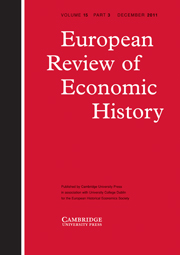Crossref Citations
This article has been cited by the following publications. This list is generated based on data provided by
Crossref.
Prados de la Escosura, L.
2008.
Inequality, poverty and the Kuznets curve in Spain, 1850-2000.
European Review of Economic History,
Vol. 12,
Issue. 3,
p.
287.
David, Thomas
2008.
Nationalisme économique et industrialisation.
p.
411.
Betrán, C.
Ferri, J.
and
Pons, Maria A.
2010.
Explaining UK wage inequality in the past globalisation period, 1880–1913.
Cliometrica,
Vol. 4,
Issue. 1,
p.
19.
Hatton, Timothy J.
2010.
THE CLIOMETRICS OF INTERNATIONAL MIGRATION: A SURVEY.
Journal of Economic Surveys,
Vol. 24,
Issue. 5,
p.
941.
Hatton, Timothy J.
2011.
Economics and History.
p.
187.
Gomellini, Matteo
and
O'Grada, Cormac
2011.
Outward and Inward Migrations in Italy: A Historical Perspective.
SSRN Electronic Journal,
Toh, Ruby
and
Tat, Hui Weng
2012.
TRADE LIBERALIZATION, LABOR DEMAND SHIFTS AND EARNINGS INEQUALITY IN SINGAPORE.
Review of Urban & Regional Development Studies,
Vol. 24,
Issue. 3,
p.
65.
Betrán, Concha
and
Pons, Maria A.
2013.
Comparing past and present wage inequality in two globalisation periods.
Scandinavian Economic History Review,
Vol. 61,
Issue. 2,
p.
140.
Giffoni, Francesco
and
Gomellini, Matteo
2015.
Brain Gain in the Age of Mass Migration.
SSRN Electronic Journal,
Ferrie, Joseph P.
and
Hatton, Timothy J.
2015.
Vol. 1,
Issue. ,
p.
53.
Hatton, Timothy J.
2015.
International Encyclopedia of the Social & Behavioral Sciences.
p.
457.
Ojala, Jari
Pehkonen, Jaakko
and
Eloranta, Jari
2016.
Deskilling and decline in skill premium during the age of sail: Swedish and Finnish seamen, 1751–1913.
Explorations in Economic History,
Vol. 61,
Issue. ,
p.
85.
Spitzer, Yannay
and
Zimran, Ariell
2018.
Migrant self-selection: Anthropometric evidence from the mass migration of Italians to the United States, 1907–1925.
Journal of Development Economics,
Vol. 134,
Issue. ,
p.
226.
Hatton, Timothy J.
and
Ward, Zachary
2018.
Handbook of Cliometrics.
p.
1.
Hatton, Timothy J.
and
Ward, Zachary
2019.
Handbook of Cliometrics.
p.
301.
Betrán, Concha
2020.
Historical Turning Points in Spanish Economic Growth and Development, 1808–2008.
p.
89.
Federico, Giovanni
Nuvolari, Alessandro
Ridolfi, Leonardo
and
Vasta, Michelangelo
2021.
The race between the snail and the tortoise: skill premium and early industrialization in Italy (1861–1913).
Cliometrica,
Vol. 15,
Issue. 1,
p.
1.
Frankema, Ewout
and
van Waijenburg, Marlous
2023.
What about the race between education and technology in the Global South? Comparing skill premiums in colonial Africa and Asia.
The Economic History Review,
Vol. 76,
Issue. 3,
p.
941.




